
미야지마의 기요모리 축제 2026
Paul Walsh헤이케 일족의 대장이였던 다이라노기요모리에게 감사의 마음을 담아, 일본 중세기 헤이안 시대의 재현 축제이며, 이는 오늘날 귀중하고 아름다운 건축물로서 지금까지도 남아 있습니다.

The Itsukushima Shrine is located on the shores of Miyajima, an island in the Seto Inland Sea not far from Hiroshima city. While the name Itsukushima means “island of worship”, the site is more famously known as “the floating shrine”, as the buildings appear to be floating on the water when the tide rolls in.
The 5-storied pagoda, on the shrine's northern side, is covered up and undergoing renovation works expected to last until December 20, 2026.
Itsukushima’s main shrine was first constructed in AD 593, and was mentioned in a famous Japanese book (Nihon Koki, or Notes on Japan) in AD 811. The shrine became popular as a pilgrimage destination for members of the Imperial Court during the Heian Period (745-1185) and remained an important location in the Edo Period for those living in western Japan.
The main shrine precinct consists of a collection of buildings, such as the Purification Hall and the stage for bugaku (court music) performances. Many of the buildings are linked by covered corridors and dotted with bronze lanterns from the early 20th century. An arched bridge, dating back to 1557, was said to be used by Imperial messengers and is one of the links between the shrine and the mainland. Most notably, Itsukushima is home to a Noh stage that dates back to the early Edo Period, and is significant for the fact that it’s the only Noh stage in the country that floats upon the sea.
Due to their history and unique design, the buildings of Itsukushima Shrine were designated as a National Treasure in 1952 and became a UNESCO World Heritage Site in 1996.
Visitors who wish to see the shrine as it “floats upon the waves” would do best to plan their visit according to the tides. A schedule of the day’s high and low tides is usually posted at the shrine’s main entrance.
Travel to JR Miyajimaguchi Station on the Sanyō Honsen Line. Walk to the ferry port. It's about 10 minutes from Miyajimaguchi Port to Miyajima Island by ferry.

헤이케 일족의 대장이였던 다이라노기요모리에게 감사의 마음을 담아, 일본 중세기 헤이안 시대의 재현 축제이며, 이는 오늘날 귀중하고 아름다운 건축물로서 지금까지도 남아 있습니다.
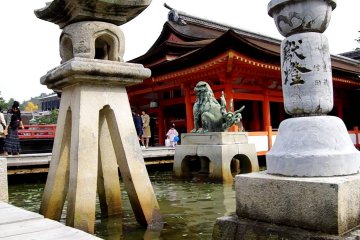

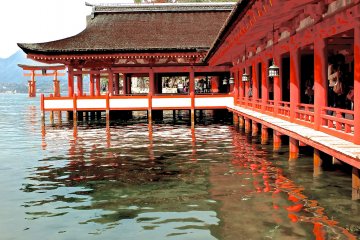

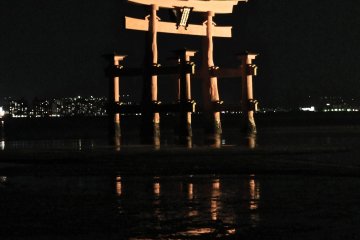
![미야지마 불꽃놀이 축제 2026 [취소됨] 미야지마 불꽃놀이 축제 2026 [취소됨]](https://a2.cdn.japantravel.com/photo/6043-41117/360x240!/hiroshima-miyajima-fireworks-hiroshima-41117.jpg)
히로시마의 가장 유명한 불꽃놀이 축제. 미야지마 섬 앞에 있는 거대한 붉은 토리 문 앞에서 60분간의 놀랍고 컬러풀한 불꽃놀이가 펼쳐진다.

헤이케 일족의 대장이였던 다이라노기요모리에게 감사의 마음을 담아, 일본 중세기 헤이안 시대의 재현 축제이며, 이는 오늘날 귀중하고 아름다운 건축물로서 지금까지도 남아 있습니다.
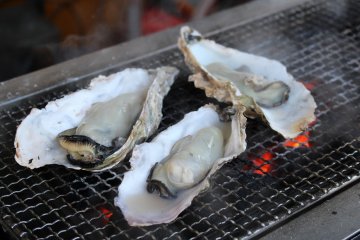
미야지마 섬의 굴 축제는 굴 시즌 동안 매년 2월에 열린다. 해산물 요리를 좋아하신다면 페리 항구 옆으로 오시면 있다. 굴 구이, 튀김, 굴 수프, 굴탕, 다져진 굴, 뎀푸라 등 여러 가지 종류를 판매하고 굴이 아니더라도 뱀장어와 다른 종류의 해산물또한 판매한다. 오랫동안 줄을 서고 싶지 않다면, 메인 이벤트가 시작되기 전에, 이곳에 아주 일찍 도착할 계획을 세우는 것을 추천한다. 축제 기간 동안 방문객들은 전통적인 일본 문화를 즐길 수 있다. 예를 들자면 전통 연극 무대 위에서 화려한 의상을 입고 춤추고 사투를 벌이는 동안 전통 피리와 타이코 북 음악을 연주한다. 축제와 어울러, 방문객들은 유명한 미야지마 섬의 경치을 감상할 수 있으니 많은 방문 부탁드린다.

The Miyajima Omotesando Shopping Street is a 350m-long arcade that acts as one of the main paths between the island's port and Itsukushima Shrine. It's a lively thoroughfare filled with souvenir shops, street-side food counters as well as cafes, bars and restaurants. A folding roof provides a canopy to shelter from both rain or sun. Local delicacies steal the show so expect oysters, conger eel, momiji manju (a baked or deep-fried snack) or Miyajima craft beer along the route. Plenty of souvenir shops sell the famous shamoji (traditional wooden rice paddle) used for serving rice. A giant rice paddle—the symbolic Ōshakushi—used to be located here but has been relocated to the nearby etto Miyajima Community Centre. With most visitors to Miyajima not necessarily staying on the island overnight, many of the shops close by 5pm or 6pm. Nonetheless, once the sun sets the street takes on a warm, charming vibe under the glow of the lantern light that lines the street.
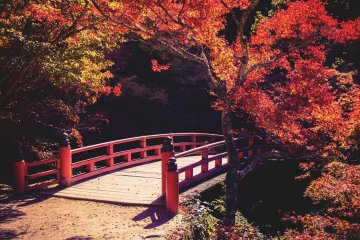
Momijidani Park (紅葉谷公園, Momijidani-Kōen) is one of the most famous maple leaves valley parks in Japan. The park is located at the foot of Mt. Misen, along Momijidani River, behind Itsukushima Shrine in Miyajima, Hiroshima. [Wikipedia]

Daishō-in or Daisyō-in is a historic Japanese temple complex with many temples and statues on Mount Misen, the holy mountain on the island of Itsukushima, off the coast of Hatsukaichi, Hiroshima, Japan. It is the 14th temple in the Chūgoku 33 Kannon Pilgrimage and famous for the maple trees and their autumn colors. [Wikipedia]